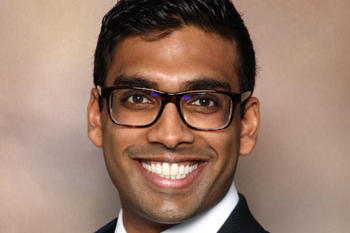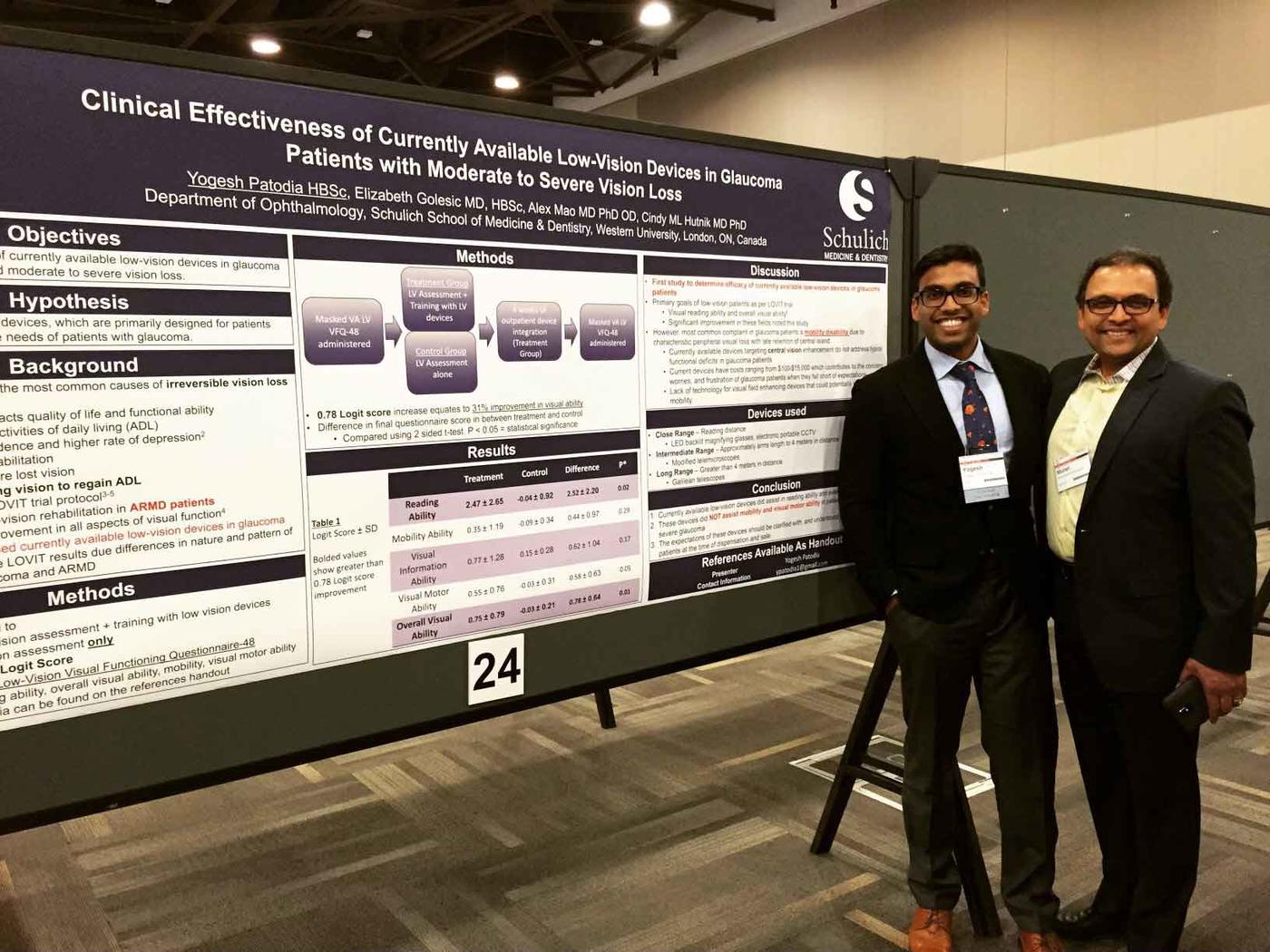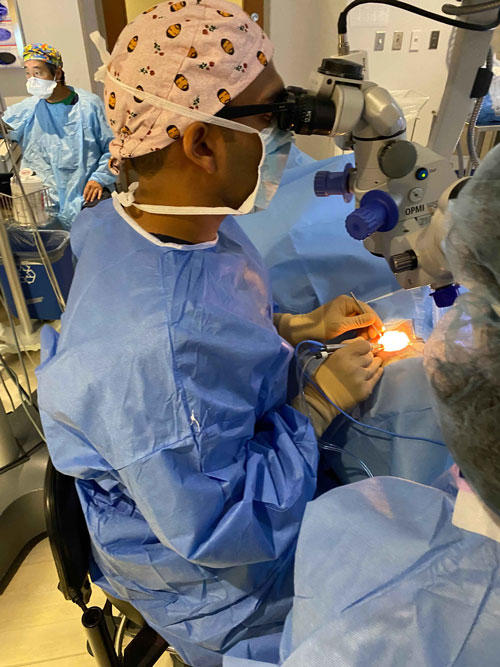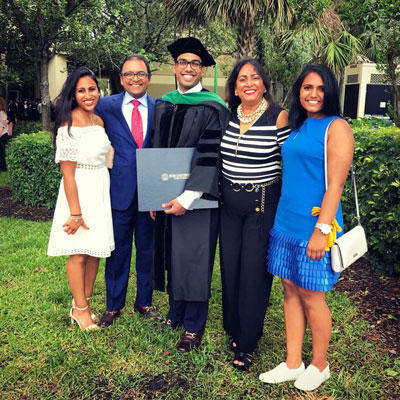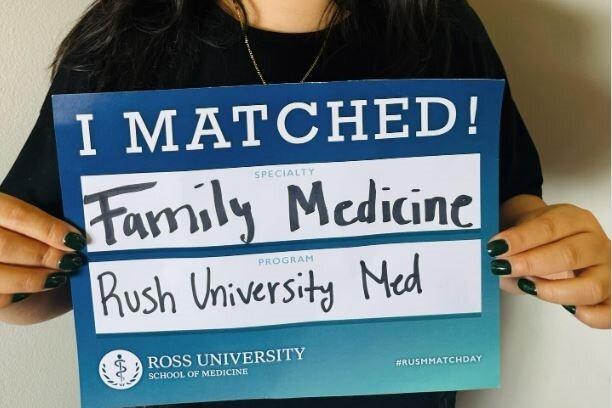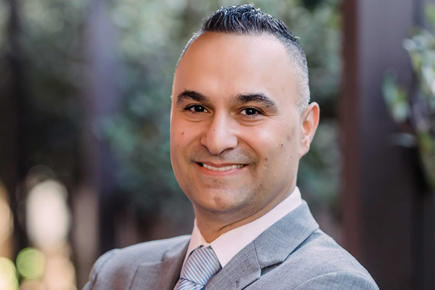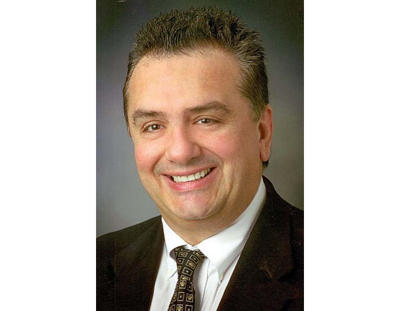Growing up in the small town of Sarnia, Ontario, Yogesh Patodia, MD, ’17, wasn’t sure he wanted to follow in his father’s footsteps. Patodia’s father is an ophthalmologist and manages a successful practice. “My Dad has always been my idol and one of my biggest mentors. My parents were immigrants from India, and both worked like crazy so my sisters and I would have every opportunity. I wasn’t interested in ophthalmology at first, but when I was 13, I started working as an ophthalmic technician in my father’s office. That put it on my radar, but it wasn’t my first choice…yet.”
Learning about the human body was always something that captivated Dr. Patodia. “For the longest time, I wanted to do orthopedic surgery. I tore my ACL as a teenager and was very interested in what my surgeon was doing. My Dad wanted me to go into dentistry! It wasn’t until I wound up doing ophthalmology research during my undergrad studies in biology and physiology at the University of Western Ontario that I began to get excited about ophthalmology. My Dad was right—it’s a fascinating specialty.”
Staying competitive is crucial to his success
While he was excited about pursuing a medical career, ophthalmology residencies are fiercely competitive, especially in Canada where only two candidates are accepted into an ophthalmology residency program a year in the entire country.
“I stayed in touch with my research mentor. She got me involved in a research project on glaucoma. The research was published and presented at conferences, and it won a Canadian Ophthalmological Society award. I was only interested in applying for Canadian residencies. I knew that I had to meet people because no one knew who I was. So, in between semesters, I’d return to Toronto from Ross University School of Medicine (RUSM) to do one-week observerships with several ophthalmologists who were on the selection committee. I showed my interest during my first two years of medical school.” Dr. Patodia continued going back during his third- and fourth-year rotations at St. Joseph Mercy Oakland Hospital in Pontiac, Michigan. “I kept very active to make sure I matched. When I arrived at my interview, everyone knew who I was, because they had already worked with me.”
Saving vision, changing lives
Now in his fourth year of residency at the University of Toronto, Department of Ophthalmology and Vision Sciences, Dr. Patodia is excited about his progress and future career. The main reason he likes the University of Toronto is that it provides a perfect location to work with a wide variety of patients. “I see patients from a broad range of socioeconomic backgrounds, including immigrants from all over the world.”
Saving the vision of patients is rewarding for Dr. Patodia, and the results are often quick. “I feel lucky to be able to help patients who are on the verge of losing their vision, or who have gone blind. I was performing cataract surgery on an older patient who is legally blind, due to their lens becoming dense and opaque. When I put in an artificial lens, he could see right away.”
Another patient had a retinal detachment when Dr. Patodia was on call late at night. “People often go blind with this condition, and it must be fixed immediately. I performed a pneumatic retinopexy; a gas bubble is injected into the vitreous cavity, and the bubble pushes and reattaches the retina, allowing for sight to be restored. A month later, I ran into the patient in the hallway. She thanked me for saving her vision. I’m fortunate to see the good that you can do by working in this field.”
Residency paves the way
“My residency program is focused on learning to be a good clinician then learning to be a good surgeon in your final years. Typically, an ophthalmology residency in the U.S. is four years, but in Canada, we do it for five. It is a challenging program, and you need to stay on top of the learning curve, and still be a good physician to patients at the end of the day,“ says Dr. Patodia.
He enjoys constantly learning new techniques. “For example, I’m learning how to do cataract microsurgery now. I get to work with amazing technology in the operating room, like ultrasonic vacuums, 3D TVs, and head-mounted lasers to repair retinal tears. The vast majority of the work is freehand and not robotically assisted. You have to have very still hands.”
In the future, Dr. Patodia’s goal is to stay in Canada and apply to a surgical retina fellowship, then work at a community hospital and have a comprehensive surgical practice. An appealing option is to take over his father’s practice and provide retina surgery to patients who now have to drive several hours to find that service. “I’d like to give back and provide comprehensive care in Sarnia, a community that has always needed it,” says Dr. Patodia. Another reason he wanted to practice in Canada is because of the publicly funded health care system. “I think health care should be a basic right. In Canada, every single citizen or permanent resident has access to good, government-funded health care. That appealed to me as a physician working to improve the health of patients.”
During his free time, Dr. Patodia is a foodie and loves experiencing the many cuisines available in the Toronto area. When he’s not at a restaurant, he is a race car driver and is at the track.
RUSM taught him how to learn—and be resilient
Looking back at his time at RUSM, he advises medical students to put time and effort into their studies and build a network. “RUSM shows you how to learn and how to study. Take advantage of your relationships with other students for support. Most importantly, do not take it easy on your time off. Canadian students doing their rotations in the U.S. will be viewed more critically than American medical students. Take every opportunity to show your academic talent and passion. When I was doing my internal medicine rotation, I was told I wasn’t smart enough to be in Ophthalmology and wouldn’t be competitive as a Caribbean medical student. You will have doubters who tell you something is not attainable. I was determined to prove them wrong. You have to have the fire to know what you want and the confidence to go for it.”

